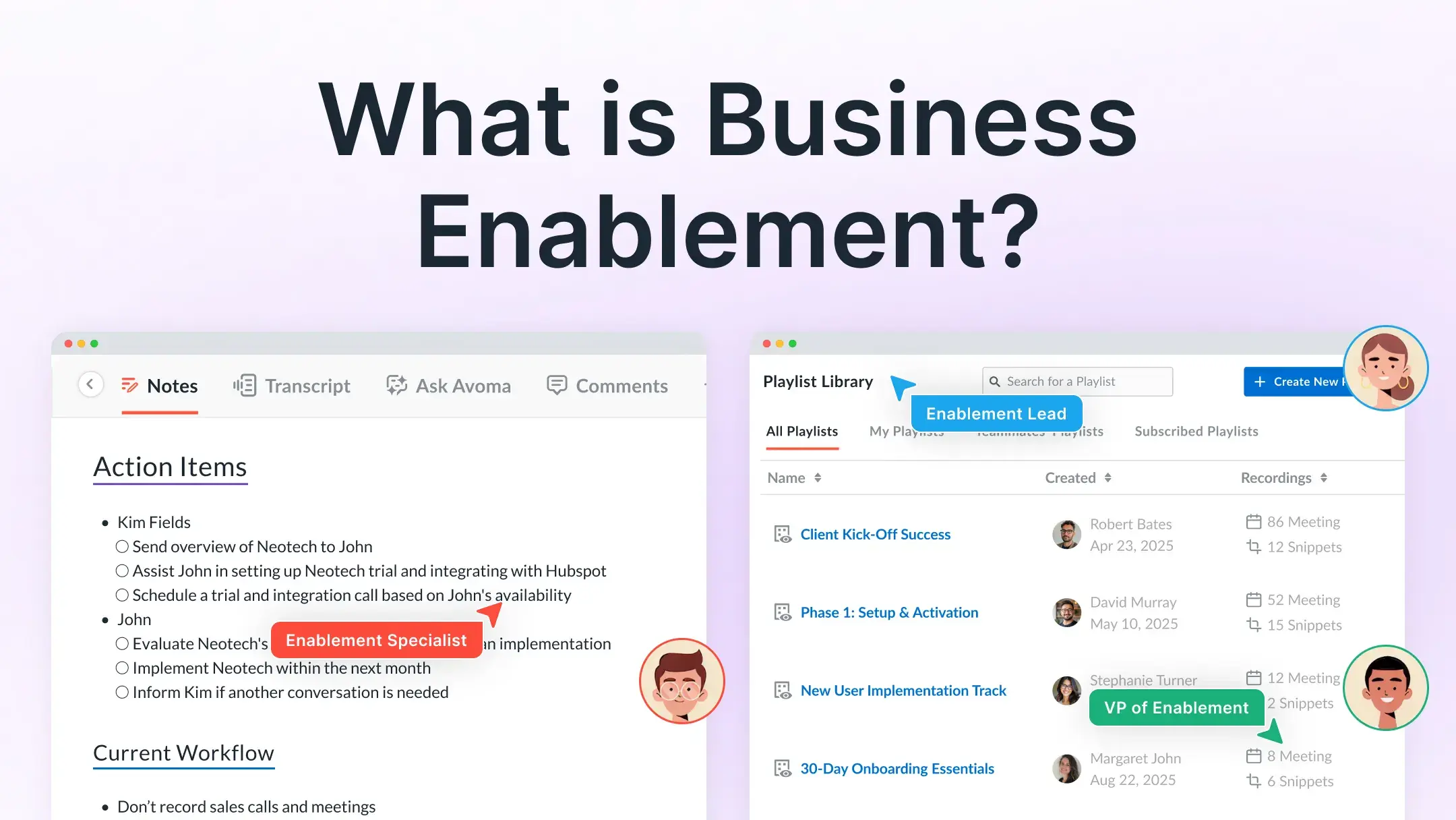The benefits of sales coaching and how to be the best coach for your team
Table of Contents:

Sales coaching is all about helping your team improve. It boosts performance and productivity by teaching new skills, reshaping how reps approach sales, and helping them break through roadblocks.
But to get the full benefits of sales coaching, you need more than a one-time effort. You need to build a culture of continuous coaching. When done right, sales coaching leads to higher win rates, better talent retention, and a more satisfying experience for buyers.
Today’s sales managers have a lot on their plates. They’re handling daily tasks, solving problems, and pushing for results. But there’s more to being a modern sales leader. To really make an impact, managers need to think like coaches, not just bosses.

As a sales coach, your role centers on instilling a culture of learning within your team. According to a recent study by the Human Capital Institute, 51% of companies with a strong sales coaching culture see increased revenue.

Surprisingly, not all managers are jumping on the coaching bandwagon. Why? Well, it's a mix of the lack of time, uncertainty about what to coach on, and not seeing immediate perks.
So, let's look at why sales coaching should be a priority for you and toss around some nifty tips on how to be the best coach for your team.
What does a sales coach do?
The primary goal of sales coaching is to help sales reps improve.
A good sales coach works closely with each individual sales representative, helping them sharpen their skills, build confidence, and tackle the real challenges they face every day.
Here’s what a sales coach actually does:
Gives clear, honest feedback
Sales coaches review calls, pitches, and emails to give direct feedback. Instead of generic advice, they focus on specifics—things like tone, timing, or how well a rep handled objections. The goal is to provide input that reps can apply right away.
Encourages skill development
Sales isn’t just about selling; it’s about active listening, building trust, handling tough questions, and understanding what a client truly needs. A coach helps reps develop these core skills to handle various sales situations.
Uses data to suggest improvement
With the right tools, like Avoma, a coach can analyze recorded calls to spot patterns in each rep's performance. They look at what’s working and what isn’t, using these insights to make specific suggestions. This approach turns data into a roadmap for growth.
Creates personalized coaching plans for each rep
Every rep has different strengths and challenges. A sales coach builds personalized plans, focusing on the skills individual sales reps need to work on most. The sales coaching process is not a one-size-fits-all approach; it’s more like having a personal trainer for sales.
Keeps reps motivated
Sales can be tough, and rejection is part of the job. A good coach helps reps stay resilient, reminding them of their progress and giving encouragement when things get hard. They help create a positive mindset that can make all the difference.
Encourages a habit of learning
High-performing sales teams don’t stay still—they adapt. A coach pushes reps to keep learning, improving, and trying new approaches. This mindset keeps the team ready for changes in the market or shifts in buyer behavior.
Why do sales managers not prioritize coaching?
We’re not judging.
There are plenty of reasons why you may not have invested more in sales coaching. The good news? Right now, you're exploring ways to improve your sales coaching strategy, and that’s the first step toward becoming a top sales coach.
Understanding why so many managers struggle to prioritize coaching can give you valuable insights to keep your own progress on track. Here are the top reasons sales managers often avoid coaching:
They don’t have time.

We often get bogged down with the day to day tasks or the questions and challenges that get thrown our way. It is difficult to set aside time to really focus on sales coaching, even when we know that many of these challenges will improve after implementing an effective coaching program.
Set aside 1-2 hours per day, even 30 minutes if that is all you have, to start. Your future self will thank you.
They are not sure how or where to start.
Not all managers are naturally skilled or trained in coaching. They might feel unsure about having coaching conversations, giving constructive feedback, or creating action plans with their team.
Remember, you can reach out to external coaches to help get things going and also help you develop your coaching skills. Lean on mentors and third parties for help.
Dive into educational resources for crafting top training programs. Whether it's podcasts, YouTube videos, or books, keep learning new skills and stay updated on the latest coaching trends.
They don’t see immediate benefits
One issue for sales managers is not seeing results fast enough. The truth is, you're not going to see a 180° change after doing 1-2 sales coaching sessions. It takes consistency and persistence.
Recognize that the true impact of sales coaching lies in its long-term benefits. Believe me, it will be worth it. You will save time and your team will be better for it.
They are too focused on deal to deal activity
It’s easy to get so wrapped up in putting out fires that you miss out on coaching to prevent future issues. The day-to-day hustle can make it hard to step back, but it also gives you a clear view of where to start with coaching.

Instead of tackling each problem one-on-one, bring the team together for a brainstorming session. Write down common questions and challenges. Are there patterns? These could be your starting points for coaching that helps reps clear roadblocks and focus on closing deals faster.
They are not consistent
A lot of sales coaches may have the best intentions and know that coaching is important but just aren't consistent.
Start backward. Identify your team's goals and pinpoint areas for improvement. Create a playbook detailing the steps required to achieve these goals and equip your team with the essential skills for success.
Make it a habit to catch up regularly with your team, both in a casual and more structured way. Set some time for one-on-one and group sessions every week with your reps for a deeper dive into personalized coaching. Getting it on the calendar and having a game plan can really make a difference.
The benefits of sales coaching
Changing the mindset from traditional sales manager to sales coach reveals so many benefits to sales organizations. The goal of sales coaching should be to guide, motivate, and inspire, focusing on skills and techniques rather than just the numbers. When your team grows, the company and revenue will follow.
A sales coach’s goal is to empower reps to work independently. True benefits of sales coaching emerge when reps become self-driven, viewing the coach as a supportive guide, not a directive authority.
According to Task Drive, only 17% of companies claim to have an effective training program which is so surprising. Yet, the best sales orgs that invest in sales coaching see 353% ROI for the average company.

There are so many benefits to having a consistent culture of learning within your sales organization from ramping new reps, to increasing productivity and closing more deals.
Here's why coaching your salespeople is important and how you can become the best sales coach:
Increase sales productivity
Sales coaching can be a real motivator for your team. By consistently coaching your reps and fostering a culture of continuous learning, you're not just guiding them – you're sparking motivation.
As a coach, you should encourage them to acquire fresh skills, think outside the box, and try out new strategies or tactics, ensuring their performance keeps rising and far from stagnation.
The best way to empower your team is through sales coaching that encourages independent thinking and creative problem-solving. Rather than jumping in with solutions, prompt them to dig deeper with questions like, “What do you think the prospect wants here?” or “How could we solve this?”
Great coaches aren’t just managers giving orders—they’re mentors guiding team members to grow into skilled salespeople and, eventually, coaches themselves. The ultimate goal? For them to no longer rely on you.
Retain top performers
Being a sales rep is like being the energizer bunny—you need those high highs and excitement to keep going. For your team to really see continuous success, they've got to feel like they're making waves, you know, actually making a difference. But that feeling can get a bit lost when there's not much room for growth.
Did you know, according to a recent Linkedin survey, 94% of employees say that they would stay at a company longer if it simply invested in helping them learn? And over 60 percent of salespeople are more likely to leave their job if their manager is a poor coach. (Brainshark)

Stop micromanaging and start guiding. Rebrand your approach to learning by sharing insights and trends with your team, helping them focus on their performance.
Motivate them with new sales strategies and tactics to elevate their skills. Make them feel valued, so they stay committed, reducing turnover and sparing you the hassle of constant hiring, onboarding, and training. It’s a win-win.
Improve team performance
If you see performance improvements in just a few reps, it's time to rethink your coaching approach. Generic, one-size-fits-all training won't work because each rep has unique strengths and areas for improvement.
Tailored coaching is key.
New reps should focus on mastering onboarding, prospecting, and call planning, while seasoned ones can refine value presentation and negotiation skills. As a team, emphasize company values, get everyone excited about product launches, and create opportunities for brainstorming and mutual support.

Managers should team up with each member for a collaborative skill check, ensuring everyone is onboard with the sales methodology. Have a monthly check in, as skills get polished, the focus shifts to keep the improvement train rolling.
So, when you huddle up with the team—both as a squad and one-on-one. Dive into calls, measure performance through scoring. Are they tripping on the same hurdles? In what situations do they really shine? Guide them to those lightbulb moments, work on their weak spots, and watch the whole team shine in their best sales selves.
Ramp up new reps faster
It’s not so uncommon to take MONTHS to onboard and get a rep up to speed, which is pretty insane. If you do see frequent changes within your sales teams, this can have a significant impact and create different challenges.
No one likes to get put in the game before they’re not ready.

No one likes to get put in the game before they’re not ready.
With a strong culture of learning in place, you now have a wealth of training materials and valuable conversations to quickly onboard new team members. Treat those recordings as a playbook—have new reps review top demo calls, team trainings, and product sessions.
We've seen reps get up to speed and demo-ready up to 3x faster, often within just a few weeks.
Always hit quota
When looking at sales orgs where they had over 75% sales reps hitting quota, a big outlier was that they spent significantly more time coaching than the average sales manager. (2023 Sales Benchmark Index) This is the impact of tactical sales coaching!

Sales quotas can feel overwhelming, and many managers think closely monitoring every deal will help their team meet targets. While this might work short-term, it's not a sustainable strategy and can lead to burnout.
Over time, you'll notice your team constantly relying on you for answers and lacking the confidence to manage deals on their own. Breaking free from this cycle can be tough.
Shift from being a manager to a coach.
Equip your reps with the tools to sharpen their selling skills and think critically, empowering them to move deals forward independently. Encourage them to find solutions to tricky questions and try new strategies without constantly coming to you.
This is where your team not only hits quotas but does so effortlessly—and they'll appreciate you for it.
Increase win rates
Deal reviews shouldn’t be off the table, but the best sales coaches approach them differently than traditional sales managers. When done with the right foundation, a coaching approach provides reps with actionable insights and helps them improve future execution.
You’ve probably sat through many deal reviews that felt more like evaluations, with your manager pointing out mistakes.
It’s time to change that.
Instead of focusing on errors, shift the conversation to uncovering new opportunities. Involve the entire team in brainstorming next steps and create a supportive environment. Clearly define the action plan, ensure everyone understands it, and check in on their confidence in executing it.
It’s not surprising here - companies with a solid, dynamic coaching program often average 28% higher win rates than their competition. (Brainshark)

Improve the buyers experience
When your sales reps improve, your buyer experience naturally improves too. They’ll gather the right information quickly and efficiently, without wasting time.
Your sales team will become experts at understanding buyers’ needs and offering tailored solutions, rather than just pushing a product. Inexperienced reps often dive into selling without fully understanding the buyer’s problems and goals, which can turn buyers off and lead to missed opportunities.
By genuinely caring about solving buyers’ problems and mastering discovery, your conversations will become more impactful. It's a crucial skill that drives everything from customer service to closing deals successfully.
Strengthen reps’ confidence and resilience
Coaching doesn’t just build sales skills—it builds mental resilience. Sales can be a tough, high-rejection job.
When you consistently coach reps on how to handle challenges and bounce back from setbacks, you help them build the confidence to tackle tough situations without losing motivation.
Resilient reps not only close more deals but also maintain the positivity and grit needed for long-term sales success with more professional development opportunities.
Build a more collaborative culture
Sales coaching promotes collaboration. By creating an environment where reps openly discuss challenges, share insights, and support one another’s development, you foster a team-first mentality.
With continuous improvement in individual skills, the whole team grows stronger, and reps start to see each other as allies rather than competitors.
Encourage long-term growth and adaptability
Great sales leaders instill a mindset of continuous learning in their reps. With regular sales coaching programs, reps develop the adaptability needed to meet changing buyer expectations and market shifts.
This mindset creates reps who are proactive, always looking to refine their approach, and eager to grow alongside the company.
How Avoma can help you become a better sales coach
As a sales manager, you probably spend hours listening to calls, giving delayed feedback, and still feel like you're missing the mark. The gap between perception and reality in call reviews is huge—after all, less than 1% of calls are manually reviewed. According to a RevVue poll, 75% of sales reps feel their leaders don’t listen to enough recorded calls.
Measuring coaching effectiveness is another hurdle.
This is where Avoma’s AI Coaching Assistant comes in.
By automatically scoring calls, Avoma ensures 100% coverage and provides real-time insights, eliminating the need for manual, ad hoc reviews. The AI highlights low scores, prioritizes areas for improvement, and offers specific coaching recommendations and ongoing feedback, so you can focus on what matters.
Avoma simplifies and amplifies the coaching process, helping you coach smarter, not harder.

AI Scorecards ensure objective evaluations, and Performance Dashboards offer leaders a clear view of team and individual performances, allowing tailored coaching initiatives for maximum impact. The Team Performance Dashboard provides visibility into trends, facilitating personalized coaching to drive revenue growth and customer satisfaction.

Let us know how we can help you become the sales coach every team will love.
Frequently Asked Questions






What's stopping you from turning every conversation into actionable insights?










